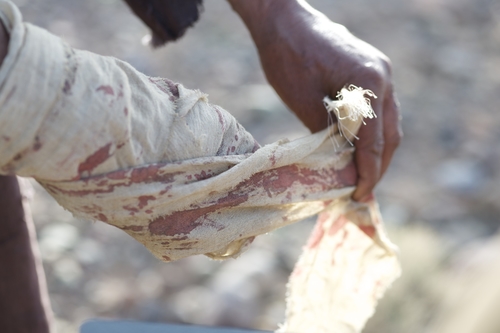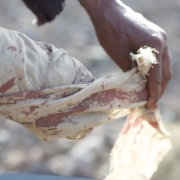Die Speisung der Einhundert
/0 Comments/in Wöchentliche Andacht/by David GuzikAber ein Mann von Baal-Schalischa kam und brachte dem Mann Gottes Erstlingsbrote, Gerstenbrote und Jungkorn in seinem Sack. Er aber sprach: Gib es den Leuten, dass sie essen! Und sein Diener sprach: Wie kann ich das 100 Männern vorsetzen? Er aber sprach: Gib es den Leuten, dass sie essen! Denn so spricht der HERR: Man wird essen, und es wird übrig bleiben! Und er legte es ihnen vor, und sie aßen, und es blieb noch übrig, nach dem Wort des HERRN. (2. Könige 4,42-44)
Wenn man diese Geschichte liest, ist man überrascht sie im Alten Testament zu finden. Wir wissen, dass Jesus zweimal eine Menge Menschen mit einigen Broten und Fischen satt kriegte (Matthäus 14,13-21 und 15,32-39). Man vergisst, dass Gott Elisa gebrauchte um hunderte von Jahren zuvor ein ähnliches Wunder zu vollbringen.

Wie auch in Johannes 6,9 hatten sie nur einige Gerstenbroteum viele Menschen zu sättigen. Gerste war schon immer ein einfaches Essen, das eher zum Füttern von Vieh genommen wurde. Im Talmud sagt einer: „ Gerste ist ein feines Getreide“ und ein anderer antwortet darauf: „sag es den Pferden und Eseln“. Mit einfachen Gerstenbrote kann man nicht viel anfangen, aber Gott braucht nicht viel.
Durch Gottes Wunder wurden aus wenigen Broten viele, und sie hatten mehr als genug. Und sie aßen und es blieb noch übrig, nach dem Wort des HERRN. Gott hatte versprochen, dass Er sich um ihre Bedürfnisse kümmerte, und sogar noch über diese hinaus. Elisa glaubte an Gottes Versprechen, handelte dementsprechend und erlebte, wie es sich erfüllte.
Gott liebt es, große Dinge durch kleine Dinge zu tun. Ich mag, was Charles Spurgeon schrieb: „Denkst du, Gott braucht uns? Denkst du, Er ist abhängig von menschlicher Kraft? Ich sage dir, unsere Schwachheit ist eine bessere Waffe für Gott als unsere Stärke.“
Hier in 2. Könige waren es 20 Brote für ungefähr 100 Leute. Bei Jesus waren es 5 Brote für 5000 Leute! In 2. Könige blieb etwas übrig, bei Jesus waren es 12 volle Körbe (Johannes 6,13).
Auch wenn Gott hier ein wundervolles Werk durch Elisa tat, war es nur ein Vorgeschmack auf ein viel größeres Werk, das Gott in und durch das wahre Brot vom Himmel, Jesus Christus, tun würde.
Lerne von dem, was Gott durch die großen Propheten im Alten Testament tat. Aber schaue im Glauben auf Jesus. Jesus ist größer als alle Männer und Frauen des Alten Testaments, und Er ist derjenige, auf den sie alle zeigten.
But a Leper
/1 Comment/in Weekly Devotional/by David GuzikNow Naaman, commander of the army of the king of Syria, was a great and honorable man in the eyes of his master, because by him the LORD had given victory to Syria. He was also a mighty man of valor, but a leper. (2 Kings 5:1)
2 Kings 5:1 introduces us to an important, powerful man – a general named Naaman. We read that he was a great and an honorable man, and that God had blessed him with victory for the Syrian army. We also learn that he was a mighty man of valor, just like Gideon (Judges 6:12), Jephthah (Judges 11:1), David (1 Samuel 16:18), Jeroboam (1 Kings 11:28), and several others. In fact, it seems that Naaman was the only Gentile the Bible says was a mighty man of valor.

General Naaman had a lot going for him, but the last three words of 2 Kings 5:1 change his story completely. With his power, status, and influence, Naaman was a great man – but a leper.
Leprosy often began with the loss of sensation in some part of the body. Because of the nerve damage, the muscles started to waste away. The hands and feet became disfigured, and often deteriorated so much that fingers and toes were lost. Over the span of 20 or 30 years a leper might lose hands and feet; it was, as William Barclay wrote, “a kind of terrible progressive death in which a man dies by inches.”
The leprosy described in the Bible was a contagious, debilitating disease that corrupted its victim and makes him essentially dead while alive. Most people thought that lepers were under the special judgment of God, deserving no pity or mercy. For all these reasons, the condition of leprosy is a picture of sin and its effects.
Remember the tragic words about Naaman: but a leper. Those words speak to us today. The effects of leprosy run deep, but by appearance, the leper is “skin-sick.” All humanity is “sin-sick.” Spiritually speaking, we are all lepers until Jesus heals us.
– No matter what we accomplish in life, we still have to deal with sin.
– Our sin-sickness makes us dead while still alive.
– We can’t heal our own sin-sickness.
– Our sin-sickness often follows a slow progression.
– Left to itself, our sin-sickness will grow worse and worse.
– Our sin-sickness will lead to death without what only God can do.
The story of General Naaman has a happy ending. That isn’t true of every sin-sick person. But Jesus knows how to heal both the leper (Matthew 8:1-3) and the sinner. Jesus rescues both the skin-sick and the sin-sick.


